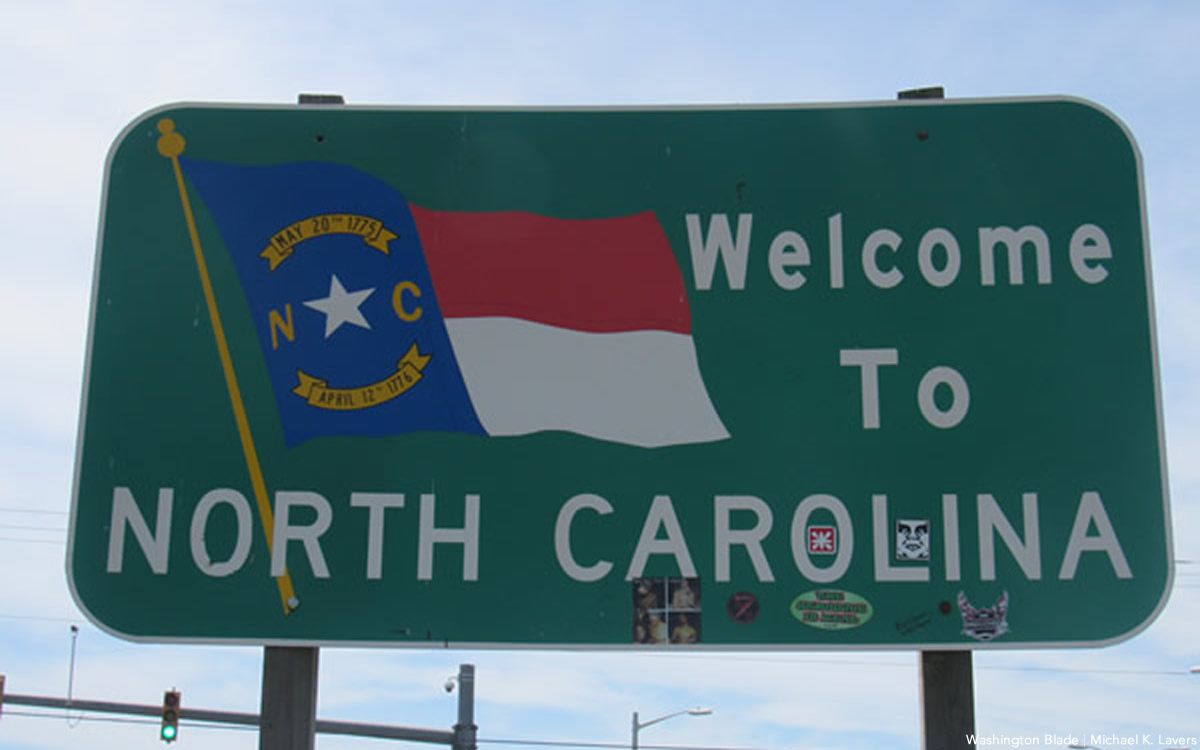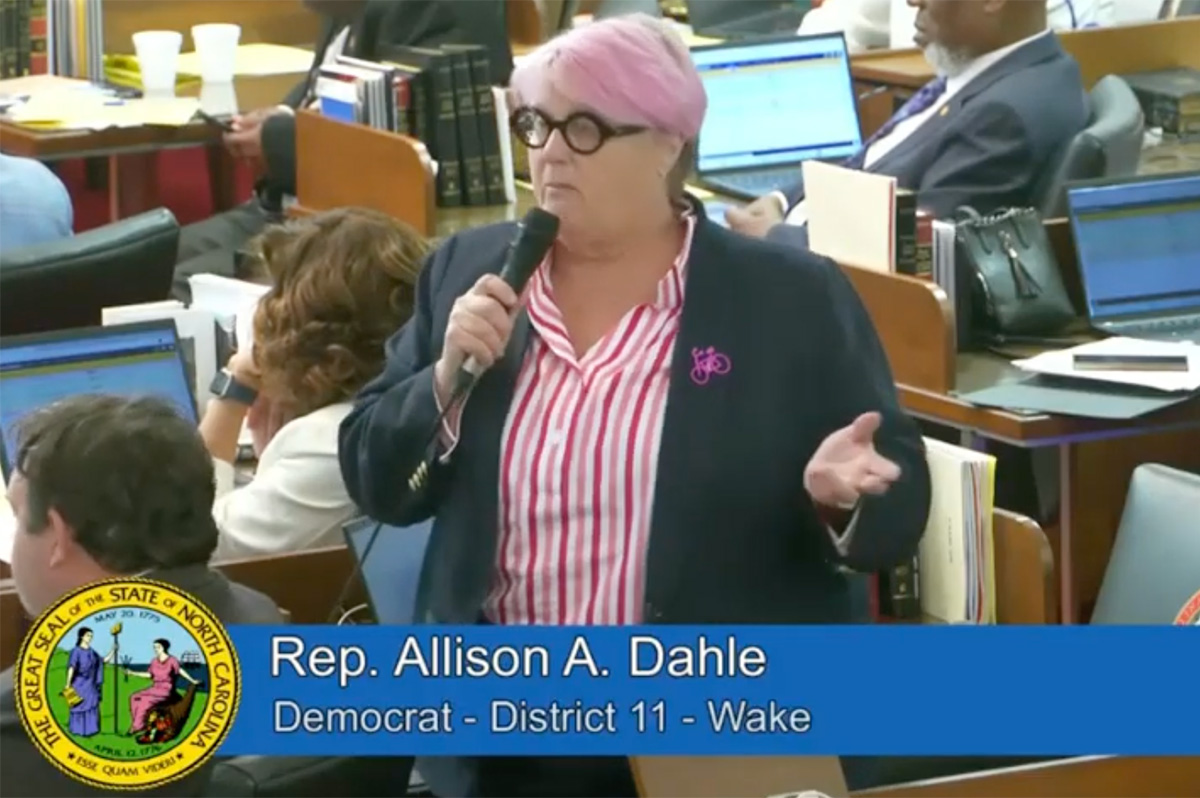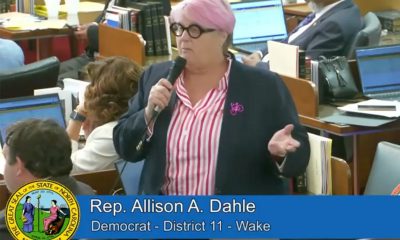North Carolina
N.C. lawmakers pass anti-transgender bills
Republican-controlled General Assembly could override Democratic governor’s veto

In the final days of its legislative session, the Republican-controlled North Carolina General Assembly advanced anti-transgender bills that would ban gender-affirming care for minors at public health facilities and trans participation in school sports.
There are two bills — one in the House of Representatives and one in the state Senate — that would ban gender-affirming care for minors.
Senate Bill 631 would make it illegal for a public health care facility, such as UNC Health — one of the largest healthcare systems in the state — to provide gender-affirming care to those under 18 years old. The bill would also limit use of state funds for gender-affirming care.
House Bill 808 would ban all health providers, public or private, in North Carolina from providing gender-affirming care to minors.
“My access to gender-affirming care saved my life,” 15-year-old Rowan Bilodeau testified to legislators. “I want others to have that same opportunity. I’m tired of seeing my brothers and sisters die because they are being denied their rights.”
Bilodeau, who has been undergoing gender-affirming transition care with the support of his parents, was the only member of the public allowed to speak against HB 808.
SB 631 passed both the House and the Senate and is currently back in the Senate for concurrence. HB 808 passed the House and is now being reviewed in Senate committees.
The House has also introduced a bill to limit trans participation in school sports. House Bill 574 would restrict trans women from playing women’s sports at the middle school, high school and college levels.
“At the end of the day, we are going to put children at risk,” Democrat Sydney Batch said during a Senate meeting. “Children are going to kill themselves. They already are. And by passing this bill, we’re going to see a higher rate … I don’t think that putting a target on their backs and putting them in a position where they could lose their lives is worth what this bill is trying to do.”
While it’s expected that Democratic Gov. Roy Cooper will veto anti-trans bills that come to his desk, Republicans hold veto-proof majorities in both chambers.
Cooper had previously signed into law the repeal of House Bill 2, known as North Carolina’s “bathroom bill.” HB2 mandated that trans people use bathrooms that match the sex printed on their birth certificate. The bill led to multiple boycotts and economic losses for the state, which some estimates put into billions of dollars.
The Human Rights Campaign has unequivocally condemned the passage of SB 631.
“SB 631 is a discriminatory effort by extremist politicians in North Carolina to attack transgender people, particularly youth and the people who support them,” HRC Senior Director for Legal Policy Cathryn Oakley said in a press release. “As these legislators know, gender-affirming care is supported by every single credible medical organization in the United States. It is best practice care that is always delivered in an age appropriate manner in consultation with parents, doctors, and medical experts.”
HRC has declared 2023 to be the “worst year on record” for anti-LGBTQ legislation, with more than 525 anti-LGBTQ bills being introduced in state legislatures across the country. According to the HRC, more than 220 of these bills specifically target the rights of trans people, the “highest number of bills targeting transgender people in a single year to date.”
A federal judge on June 20 stuck down Arkansas’ ban on gender-affirming care for minors, the first of its kind in the nation.
“Rather than protecting children or safeguarding medical ethics, the evidence showed that the prohibited medical care improves the mental health and well-being of patients and that, by prohibiting it, the State undermined the interests it claims to be advancing,” U.S. District James Moody, Jr., wrote in the ruling.
North Carolina Democrats raised the idea of a ban in the state being subject to similar litigation.
“If we pass this law, it’s going to cause more litigation. We have an indication from federal courts that this is unconstitutional,” Democrat Marcia Morey said. “We are once again interfering in a family and child’s medical decisions.”

North Carolina
Anti-trans bills in NC may trigger showdown with state’s Democratic governor
State Rep. Allison Dahle spoke out against effort

Anti-trans legislation passed this week by North Carolina’s Republican-controlled General Assembly will now head to the desk of Democratic Gov. Josh Stein, potentially setting up a showdown with just a few days before the legislature is set to break for the summer recess.
State Rep. Allison Dahle (D-Wake) told the Washington Blade during a phone interview Monday that she was “as confident as I can be” that Stein will reject the bills and also that her Democratic colleagues will line up behind him to block Republicans if they try to override the governor’s veto, which would require support from three-fifths of the House and Senate.
At the same time, there is a good chance one or two members will decide the outcome. Holding 30 of the 50 Senate seats and 71 of the 120 House seats, Republicans can clear the three-fifths threshold so long as there are no defections or abstentions and at least one House Democrat joins with the GOP caucus to override a veto.
Additionally, Dahle stressed that there are no guarantees, particularly as redistricting and shifting demographics can upend expectations for how legislators might ultimately come down on controversial votes. For example, legislation easing gun control restrictions was vetoed last week but remains in limbo because 10 House Republicans did not vote while two joined the unified Democratic caucus in opposing the bill.
With respect to the anti-trans bills passed this week, Dahle said she will “work within every inch, every millimeter of my power” to stop them from becoming law.
First was the Parents Protection Act, which per the Associated Press would “shield parents, guardians and caregivers from being cited for child abuse or neglect because they ‘raise a juvenile consistent with the juvenile’s biological sex,'” and prohibit adoption agencies from denying applicants based on their “unwillingness to allow the child to transition.”
The General Assembly passed the measure Monday with nine House Democrats joining with the GOP caucus. If those margins hold, Republicans would easily have enough support to override a veto.
On Tuesday, the North Carolina Senate passed a bill aimed at strengthening protections against the online sexual exploitation of women and children, legislation that had earned broad bipartisan support before Republican senators led by Buck Newton (Wilson) tacked on a series of anti-trans measures in committee last week, costing four votes from his caucus.
The provisions targeting transgender rights are effectively extensions of culture war legislation that was passed in 2023 during North Carolina’s last legislative session with Republicans overriding a veto from then-Democratic Gov. Roy Cooper.
Specifically, the bill passed on Tuesday would (1) extend the existing ban on most gender-affirming care for minors such that prisoners would not receive state funded gender transition hormones and therapies, (2) require officials who provide new birth certificates with updated gender markers to attach the original document with the individual’s birth sex, and (3) affirm the restrictive definitions for sex and gender that were outlined in President Donald Trump’s Jan. 20 “Defending Women” executive order.
Implications extend well beyond NC
North Carolina’s politics are often eyed as a bellwether or harbinger of trends and developments well beyond its borders because the state’s electorate is closely divided, races are often decided by razor thin margins, and control of the three branches of government is split between the two parties.
One clear take away from the anti-trans bills passed by the General Assembly this week, as noted by the AP, is how closely these efforts align with Trump’s policy agenda in his second term.
Dahle suggested that the culture war bills proposed and supported by her GOP colleagues, including those now awaiting Stein’s signature or veto, reflect the extent to which far-right wing advocacy groups are increasing their influence and exercising their leverage over conservative-led policymaking in the Tar Heel State.
Asked whether she thinks the battle over trans rights legislation in her state will have national implications, Dahle said North Carolina and Texas tend to be where Republicans launch trial balloons to see how far they can push their extreme policy proposals and their efforts to, for instance, undermine elections or redraw district maps to disadvantage Democrats.
She pointed to Allison Riggs, a Democrat who was sworn into the North Carolina Supreme Court on May 13, more than 180 days after she was elected and following a months-long battle in which her Republican opponent and his allies and supporters sought to throw out more than 68,000 votes. Riggs during the ceremony called out “efforts to undermine our rights and our democracy.”
“That was a test case,” Dahle said. “They felt like they had to try.”
With respect to efforts to undermine trans rights through legislation, Dahle said arguments against government involvement in the private lives of its people that might once have appealed to conservatives or libertarians are not picking up traction.
“None of the old school Republicans are left,” she said. Those who have left the General Assembly “know that this is wrong,” while GOP members currently serving either believe these bills serve the best interests of their constituents because “they’ve been fed a line of B.S.” or “they’re just not paying attention and they’re voting with their caucus.”
Dahle continued, “The bills are so extreme. They’re going over anything and everything having to do with transgender people. I mean, anything that has to do with care. I still, for the life of me, don’t know how this has anything to do with family values.”
She added that Republican colleagues promised during debate over a book ban proposal earlier this year that it would be the last culture war bill for a while. “it was pretty much over, or that’s at least what I was told by my colleagues on the other side, and then this one just came out of nowhere.”
North Carolina
NC lawmakers override vetoes of anti-transgender bills
Advocacy groups have labeled measures #SlateofHate

The North Carolina General Assembly overrode Democratic Gov. Roy Cooper’s vetoes of three anti-transgender bills in a late session Wednesday.
Cooper vetoed House Bill 574, House Bill 808 and Senate Bill 49 on July 5, stating in a press release the measures were “a triple threat of political culture wars using government to invade the rights and responsibilities of parents and doctors, hurting vulnerable children and damaging our state’s reputation and economy … .”
HB 574 bans trans girls and women from playing on girls and women’s middle school, high school and college sports teams. The House of Representatives overrode the veto by a 74-45 margin. The Senate followed suit.
“Since 2019, there have been only two transgender girls playing sports in the state of North Carolina … these girls are certainly not trying to destroy women’s sports. These girls are just trying to belong,” state Sen. Julie Mayfield (D-49) said.
HB 808 bans all health providers, public or private, in the state from providing gender-affirming care to minors. House lawmakers voted 73-46 to override the governor’s veto. The Senate followed suit by a 27-18 vote margin.
“This may be the most heartbreaking bill in a heartbreaking session,” state Sen. Lisa Grafstein (D-13) said. “This bill tells parents how to raise their kids … There have been so many families who have pleaded with us, testified before us, about this bill … The implication is somehow 30 people in this room know better than the families and children who know the pain we’re putting them through …”
SB 49 requires public school staff to tell parents and guardians if a student asks to use a new name or set of pronouns. The Senate overrode the veto by a 27-18 vote margin, followed by a 72-47 House vote. Some teachers are already planning to protest and act against the bill, according to the Associated Press.
“The legislature finally comes back to pass legislation that discriminates … Yet they still won’t pass a budget when teachers, school bus drivers and Medicaid Expansion for thousands of working people getting kicked off their health plans every week are desperately needed,” Cooper said in a press release prior to votes. “These are the wrong priorities, especially when they should be working nights and weekends if necessary to get a budget passed by the end of the month.”
North Carolina
N.C. governor vetoes three anti-LGBTQ bills
Republicans maintain super-majorities in General Assembly

North Carolina Gov. Roy Cooper vetoed three anti-LGBTQ bills on Wednesday.
The measures would ban gender-affirming care for minors, restrict transgender participation in school sports and limit the ways sexuality and gender are discussed in public schools.
While the vetoes are a roadblock for anti-LGBTQ lawmakers in the state, they have little power as the state’s House and Senate hold veto-proof Republican majorities.
Cooper, a Democrat, denounced all three bills in a press release as “a triple threat of political culture wars using government to invade the rights and responsibilities of parents and doctors, hurting vulnerable children and damaging our state’s reputation and economy … ”
House Bill 574, titled the “Fairness in Women’s Sports Act,” would ban trans girls and women from playing on girls and women’s middle school, high school and college sports teams.
“We don’t need politicians inflaming their political culture wars by making broad, uninformed decisions about an extremely small number of vulnerable children that are already handled by a robust system that relies on parents, schools and sports organizations,” Cooper said of the bill. “Republican governors in other states have vetoed similar bills because they hurt their states’ reputation and economy and because they are neither fair nor needed.”
Republican governors — Eric Holcomb of Indiana, Spencer Cox of Utah and Doug Burgum of North Dakota — have previously vetoed bills that would ban trans people from participating in team sports that align with their gender.
Senate Bill 49, or the “Parents’ Bill of Rights,” would require public school staff to tell parents if a student asks to use a different name or set of pronouns. Trans and nonbinary students testified to the General Assembly that the bill made them fear of forced outing to unaccepting parents, leading to an exception which would allow schools to withhold information if there is reason to believe it would lead to abuse. The bill would also ban teaching about gender identity and sexuality in kindergarten through fourth grade, with exceptions for student-initiated questions.
“Parents are the most essential educators for their children and their involvement must be encouraged, but this bill will scare teachers into silence by injecting fear and uncertainty into classrooms,” Cooper said. “This ‘Don’t Say Gay’ bill also hampers the important and sometimes lifesaving role of educators as trusted advisers when students have nowhere else to turn. The rights of parents are well established in state law, so instead of burdening schools with their political culture wars, legislators should help them with better teacher pay and more investments in students.”
Some teachers are already planning to protest and act against the bill, according to the Associated Press.
House Bill 808 would ban all health providers, public or private, in North Carolina from providing gender-affirming care to minors. There is currently a Senate bill in committee review that would ban only public health care providers from providing gender-affirming care to minors.
“A doctor’s office is no place for politicians, and North Carolina should continue to let parents and medical professionals make decisions about the best way to offer gender care for their children,” Cooper said. “Ordering doctors to stop following approved medical protocols sets a troubling precedent and is dangerous for vulnerable youth and their mental health. The government should not make itself both the parent and the doctor.”
A federal judge on June 20 struck down Arkansas’ ban on gender-affirming care for minors, which Democrats in North Carolina warned could also happen with HB 808.
Initial vote counts indicate that the governor’s vetoes will likely be overridden, which would add North Carolina to the list of 20 states that have enacted similar anti-LGBTQ laws.
-

 U.S. Supreme Court1 day ago
U.S. Supreme Court1 day agoSupreme Court to consider bans on trans athletes in school sports
-

 Out & About1 day ago
Out & About1 day agoCelebrate the Fourth of July the gay way!
-

 Maryland4 days ago
Maryland4 days agoSilver Spring holds annual Pride In The Plaza
-

 Opinions4 days ago
Opinions4 days agoSupreme Court decision on opt outs for LGBTQ books in classrooms will likely accelerate censorship







